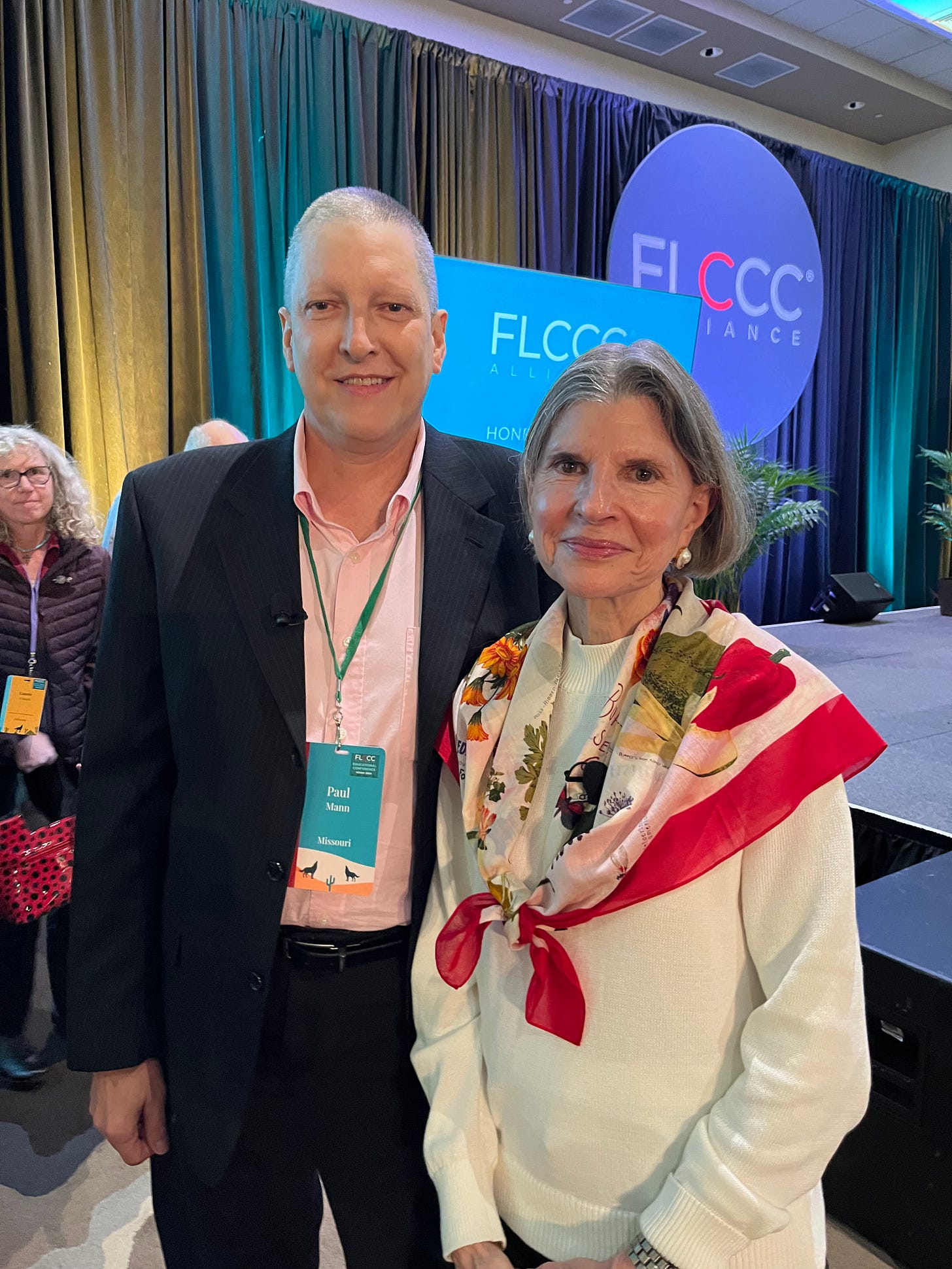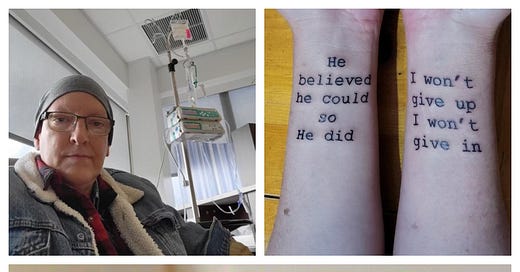Patient Zero Comes Back From Stage Four Cancer: Was It Ivermectin?
Physicians at five clinics nationwide will try to answer that question.

After ten rounds of radiation and six of chemotherapy, Paul Mann, fifty-five years old, wanted to know his chances. “You’re squeaking by day to day,” his doctor told him. It had been five months since his diagnosis. He was referred to a hospice service and seen by a minister.
Then something happened of which most end-of-the-line cancer patients can only dream.
Mann, a government intelligence analyst from Fenton, Missouri, received a call from a doctor he had heard about from a friend; the doctor had treated breast cancer for thirty years. They talked for three hours in calls that became a Tuesday routine. Early on, a drug named ivermectin came up. It was approved, had few side effects, and had been shown in laboratory and animal studies to kill several kinds of cancer cells.
Mann got some of it himself, making an eight-hour round-trip drive to Tennessee, the only state where ivermectin can be bought over-the-counter. He took it every day. And two months later, this man with almost no chance of survival was in remission.
“In Paul Mann’s case, the response to treatment after two months of ivermectin was nothing less than astonishing,” said Mann’s guardian angel, Dr. Kathleen Ruddy, a retired cancer surgeon and author of a book on breast cancer. “Off the charts astonishing.”
Mann may someday be called Patient Zero in a first-of-its-kind study, announced by the FLCCC Alliance at its conference today, to see if old drugs like ivermectin work for cancer. Dr. Paul Marik, FLCCC chief scientific officer, and Dr. Ruddy, who was trained at Memorial Sloan Kettering Cancer Center, will become partners in an “observational study” involving 500 patients and five clinics nationwide. The goal will be to learn if repurposed drugs improve five-year survival rates for several types of cancer, including breast, prostate, lung, and colorectal, an FLCCC press release states.
Dr. Ruddy did not treat Mann but rather talked a dying man through his options. In the same manner, patients in the new study will choose which FDA-approved drugs—like ivermectin, mebendazole, nitazoxanide and others—they want to use to treat their cancers, either along with or instead of traditional therapies. Their progress will be overseen and tracked by clinicians who will share anonymous patient information across sites in a collaboration to see what works.
Of prime importance, “If you have a look at the list of drugs, they are completely safe and devoid of significant side effects,” said Dr. Marik, who wrote a book on repurposing drugs for cancer. “That’s what oncologists don’t like.”
Indeed, the idea to challenge American cancer care with off-the-shelf drugs is, indisputably, a daring undertaking. That’s just one reason why it will be performed “methodically, impartially, and according to the highest standards of medical research,” Dr. Ruddy said.
“We must make sure this is absolutely above board because people are going to go after us furiously,” Dr. Marik told me.

‘Not dying now’
Mann told his story today at the sold-out FLCCC conference in Phoenix; before going public, he and Dr. Ruddy shared it with me.
When Paul Mann was diagnosed in June of 2022, his chest, abdomen, and pelvic region were riddled with tumors. The cancer had invaded his spine and sternum; it was in his ribs and shoulders. His PSA level, the prime indicator of prostate cancer—where the cancer began—was “off the charts,” said Ruddy, who trained at Memorial Sloan-Kettering and cared for 10,000 breast cancer patients.
Here are some of the things Mann recalls doctors telling him during his four months of traditional care:
“You are completely full of cancer; you are well beyond any kind of surgery.”
“There’s no cure. We’re just trying to prolong things as much as we can.”
“We’ve done the best we can. That’s kind of all there is that can be done.”
At one point, Mann was hospitalized for more than a month for chemotherapy complications and radiation esophagitis, his timeline shows. At the end of treatment in October 2022, he could only say that radiation had eased the debilitating pain in his right pelvis and chemotherapy had resolved the cancer in his skull.
That was when Mann got the call from Ruddy. A month later, he started ivermectin. But he took other things too: ground flax seed to reduce tumor-feeding testosterone; chaga mushroom powder and antioxidant-rich soursop extract; high-dose vitamin D and zinc. He stopped eating sugar.
“He was dying, and the man’s not dying now,” said Dr. Ruddy. “He goes out and dances three times a week.”
His current PSA level is so low that Ruddy said it indicates “complete biochemical remission.” The tumors disappeared and cancer in other parts of his body appear to have stopped growing. “His clinical remission over the past year has also been remarkable—very close to a ‘complete clinical remission’ at this point in time.”
Having run five marathons and many more half marathons, Mann was strong and ready for the fight of his life. He is happy to be alive, but the experience has left him “kind of just numb and shell-shocked.”
“People know cancer is bad,” Mann told me. “People know chemo makes you throw up. They don’t know about the cold table you lay on in the radiation treatment room. Or how lonely it is at 3 a.m. in a hospital room when you’re so cold you can’t sleep.”
No miracles promised
Prompted by her experience with Mann, Ruddy launched a small study in which, over the last year, she monitored cancer patients treated by other doctors. The patients, like Mann, took repurposed drugs, made lifestyle and diet changes, and often also took traditional cancer therapies. “I’ve seen truly astonishing results, not in every case but in a sufficient number of cases,” she said in the press release.
Her project is not about a miracle cure. Rather, it hopes to offer a new model for cancer remission that is affordable, readily available, and has few of the devastating side effects known to many chemotherapy patients. On cost: I recently checked with an international distributor of ivermectin, which many doctors used effectively against Covid-19. The price was 25 cents per 12 milligram pill, not including $35 for shipping.
Big Pharma will not like this movement, which is a problem in itself.
So is ivermectin’s false reputation—honed by the U.S. Food and Drug Administration as a way to usher in Covid vaccines—as harmful “horse paste.” Mann didn’t buy it. “IVM was really raked over the coals and given a bad name,” he said. “I believed the good things about ivermectin,” including that its developers won the Nobel Prize in 2015 and that it effectively treated Covid-19. Beyond that, the scientific literature is rife with studies of common, old drugs—ivermectin, mebendazole, fenbendazole, and more—that killed cancer cells or otherwise facilitated the process.
Ruddy’s study is overseen by an ethics board that helps guide the project’s goals of patient safety, scientific rigor, independent statistical analysis, and eventual peer review. In looking for improved survival rates compared to historical controls, the study will also attempt to tease out the role of other factors—for example the menu of supplements Mann took.
I asked Ruddy what the chances were that Paul Mann would come back from the brink? “It approaches zero in historical controls,” she told me.
God of Pi
The possibilities of the project are captured in Ruddy’s name for it: God of Pi. “I believe that Pi is the mathematical proof of the existence of God,” she said. “Infinitely indivisible.”
Operated under a Private Membership Association, the repurposed-drugs project will be open to patients with any type of cancer because that’s where the medical literature points. “Twenty years of research in the lab shows ivermectin works against . . .” and here she lists so many cancers, so fast, that I get breast, uterine, pancreas, esophageal, squamous cell, but can’t keep up. Finally, she says, “Just name one.”
While she talks a lot about ivermectin, Ruddy does not want to oversell the potential of ivermectin or any other drug, like mebendazole and metformin, which are commonly mentioned in reports on repurposed drugs for cancer. “We need to think methodically, so not to be sensational, overpromising,” she said. “It’s very, very important to me to protect the integrity of the study. The way to protect the integrity is to acknowledge: It’s a study.”
In that vein, the trial isn’t run by a protocol. Rather, it is a living, evolving exploration of what works similar, Ruddy says, to the famous seventy-five-year Framingham heart study, which changed drug, health and dietary advisories by years-long observation of thousands of people across three generations.
Still has cancer
More than 400 days have passed since Mann’s dire diagnosis. He is alive, active and working. He cannot say if this is because of his last-ditch ivermectin or the supplements or a combination, all of which he continues to take. He says he still has cancer.
“I still have metastasis in the bones,” he said. “I’m still a stage 4 cancer person . . . I really don’t consider myself a survivor yet.” But he surely has better odds. And hope.
Ruddy won’t discuss the overall results of her study so far, and data will not be available for some time. Releasing numbers of successes and failures would be a breach of protocol and unethical in a study that must be extremely well done and careful.
“If we don’t get this one right, no one is going to get it right for a good long while,” she told me. “We are breaking ice here. We will be attacked. We will be maligned. We’ve got to conduct the study in a way so attacks don’t undermine the work.”
Dr. Marik summed up the establishment response to ivermectin’s potential during during a panel at the conference. “This little fungus that grew in a golf course in Japan,” he said, “is scaring the shit out of them.”
Here’s the text of today’s announcement by the FLCCC Alliance:
FOR IMMEDIATE RELEASE
February 2, 2024
CONTACT:
FLCCC Alliance Announces Its First Groundbreaking Study to Determine Efficacy of Repurposed Drugs in Treating Cancer
A team of U.S. clinicians will participate in an observational study to determine improvements in the five-year survival rate for several types of cancer
WASHINGTON, D.C. – Today, at their sold-out education conference, the FLCCC Alliance announced that it has partnered with renowned breast cancer physician and researcher Kathleen Ruddy, MD, to conduct an observational study in five U.S. clinics to track patient responses to various adjunct cancer therapies using repurposed drugs and determine improvements in the five-year survival rate to several types of cancer including breast, prostate, lung, and colorectal.
More people than ever will be diagnosed with cancer this year, according to the American Cancer Society. Conventional cancer treatments have succeeded in preventing more than 4 million deaths from cancer since 1991. However, emerging research continues to demonstrate that more can be done using treatment regimens that include well-studied repurposed drugs.
“We hope that our research will bring attention to often overlooked methods for treating cancer as well as managing the symptoms from conventional treatment,” said Paul E. Marik, M.D., FCCM, FCCP, lead author of the study, chief scientific officer of the FLCCC and former Chief, Pulmonary and
Critical Care Medicine at Eastern Virginia Medical School. “Our research is intended to advance a better understanding of how cancer can be treated more efficiently, with fewer side effects, through using well-studied approaches that include readily available medications that are well-studied and known to have minimal side effects.”
The final study results will focus on improvements in the five-year survival rate of certain cancers and include patients from five clinics nationwide that will collaborate and share anonymous patient information in a centralized collection tool where the data will be tracked and analyzed.
“Cancer continues to increase at an alarming rate, especially among younger populations, creating an imminent public health crisis,” said Kathleen Ruddy, MD, founder of the New Jersey-based practice Breast Health and Healing. “Over the past year, I’ve had the privilege of following patients with a
variety of cancers who’ve chosen to use FDA-approved, alternative medications as part of their cancer care. I’ve seen truly astonishing results, not in every case but in a sufficient number of cases that I am compelled to continue to pursue the question, ‘Do drugs like ivermectin, mebendazole, nitazoxanide and others improve the survival of patients with cancer?’ I am thrilled and honored to have the opportunity to partner with Dr. Marik and the FLCCC to answer this question methodically, impartially, and according to the highest standards of medical research.”
The five clinics participating in the study are:
Breast Health and Healing, led by Kathleen Ruddy, MD.
Leading Edge Clinic, led by Pierre Kory, MD, MPA and Scott Marsland, FNP-C
Brio Medical, a holistic, integrative cancer healing center, led by Nathan Goodyear, MD
Meakin Metabolic Care, led by Charles Meakin, MD
James Clinic, led by Mollie James, MD
The FLCCC Alliance published its Cancer Care Monograph in June 2023. A copy of the monograph can be found here: https://covid19criticalcare.com/reviews-and-monographs/cancer-care/
About the FLCCC Alliance
The FLCCC Alliance was organized in March 2020 by a group of highly published, world renowned critical care physicians and scholars with the academic support of allied physicians from around the world. FLCCC’s goal is to research and develop lifesaving protocols for the prevention and treatment of COVID-19 in all stages of illness including the I-RECOVER protocols for “Long COVID” and Post Vaccine Syndrome. For more information: www.FLCCC.net





Ivermectin interferes with irregular cells, parasites, spike proteins, cancer. Makes perfect sense.
The Cancer Industry has been operating in ITS best interests and NOT the best interests of patients for decades. There are too many reports of Oncologists prescribing chemo treatments based on which has the highest price and greatest profit margin instead of what is most likely to help the patient, which is why they will HATE this study! They want to sell an $80,000 to $250,000 treatment protocol, not a $500 one.
And cancer research is mostly still "barking up the wrong tree" of things like targeted genetic treatments, which is an impossible dead-end with one tumor possibly containing thousands of genetic mutations. Cancer IS NOT A GENETIC DISEASE!!!! It is a METABOLIC disease, primarily of damaged, faulty mitochondria and cellular energy production. People need to get their bodies and immune systems HEALTHIER, NOT to POISON them! The entire current premise is completely wrong. Targeting cancer cells with repurposed drugs such as Ivermectin and Fenbendazole, that often work metabolically in numerous ways, such as triggering apoptosis, and "throwing the kitchen sink" at it with such things as medicinal mushrooms, herbs, paw paw, turmeric, mistletoe, berberine, quercetin, CoQ10, melatonin, and supplements to support the immune system such as HIGH DOSE vitamins C and D, selenium, iodine, zinc, etc., probably give the patient the best chance.
HOWEVER . . . the power of the human mind MUST be factored in and optimized. I am of the opinion that all the drugs and supplements in the world will ultimately be useless without the right mindset and willingness to work on the non-chemical or "non-physical" aspects also. This encompasses attitudes and beliefs, KNOWING that cancer can be healed and giving THAT message to the subconscious mind. Somehow, attitude has a huge impact on immune function. It is the "Placebo Effect" IN ACTION, and it is POWERFUL, bringing about dramatic PHYSIOLOGICAL changes. Visualization techniques that imagine the tumors going away send a strong messase to the subconscious that can affect hormones and the immune system in helpful ways. Also, energetic healing methods somehow affect the function of cells and the immune system. This has even been demonstrated with plants and microbial cultures. It can be harnessed to augment whatever else is being done: Reiki, Qi Gung, acupuncture/acupressure, "hands on" healing techniques such as channelling healing energy through the the palm chakras, etc. can be powerful support for healing.
Like I said — "throw the kitchen sink at it"! If the methods are harmless (or in the case of repurposed pharmaceuticals, nearly so), why not hit the cancer from every possible direction? If I were diagnosed, I would!